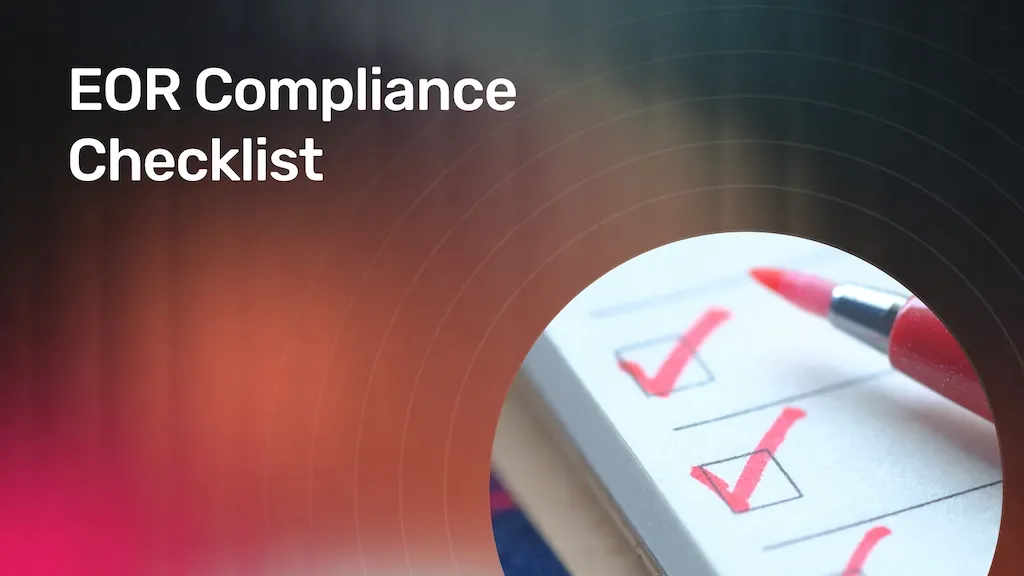EOR Compliance Checklist: What You Need to Know Before You Hire
Hiring internationally is exciting—until legal and compliance risks start stacking up. That’s where an Employer of Record (EOR) can help. But not all EORs are created equal. Before you sign on the dotted line, ensure your partner can protect your business from costly mistakes. Use this checklist to confirm full EOR compliance and avoid surprises down the line.

What is EOR compliance?
EOR compliance refers to the legal and regulatory responsibilities an Employer of Record must fulfil when hiring employees on behalf of another company. This includes ensuring that employment contracts follow local labour laws, statutory benefits are provided, payroll and taxes are accurately processed, and employee rights are protected.
Without proper EOR compliance, your business could face fines, lawsuits, or even be banned from operating in certain countries. It’s not just about ticking boxes—it’s about safeguarding your company’s reputation and operations globally.

EOR compliance checklist: What to confirm before hiring
Before you start your partnership with an EOR company, you can use an EOR compliance checklist to confirm if you’re on the same page with the company or not.
Is the EOR legally registered in the country of hire?
A legitimate Employer of Record must have an established legal entity in the country where you intend to hire. This is the foundation that gives them the legal authority to employ staff, manage payroll, pay taxes, and administer statutory benefits on your behalf. Without a legal presence, they may operate through intermediaries or grey-market structures, which expose your business to risk.
Why it matters:
If an EOR is not formally registered in the jurisdiction where your employees are based, you could be engaging in unauthorised employment arrangements. This creates legal exposure for your company, including fines, loss of IP protection, and reputational damage. It also means your employees may not be officially recognised under local labour laws, putting their rights—and your credibility—at risk.
Ask yourself:
- Can the EOR provide verifiable proof of local company registration?
- Are they listed in the official government business registry?
- Do they directly employ staff or rely on third parties or shell entities?
Are employment contracts fully localised and legally valid?
Every country has unique employment laws that dictate how contracts must be written, what clauses are required, and how benefits, working hours, and termination procedures are handled. A one-size-fits-all or translated contract isn’t enough—local legal expertise is essential.
Why it matters:
A contract that fails to comply with local legislation may be unenforceable, leaving your business vulnerable in the event of disputes. For instance, if an employee is terminated and the contract doesn’t reflect the country’s statutory protections, courts are likely to side with the employee. Localised contracts also demonstrate your company’s commitment to ethical and lawful employment.
Ask yourself:
- Are employment contracts drafted or reviewed by local legal counsel?
- Do they reflect up-to-date statutory entitlements and notice periods?
- Are clauses related to working time, bonuses, and termination aligned with local norms?

Is the EOR up to date with local labour laws?
Labour laws are constantly evolving, with frequent updates to wages, leave entitlements, remote work regulations, and employer responsibilities. Your EOR should actively monitor these changes and reflect them in employee documentation and company policies.
Why it matters:
Non-compliance isn’t always a result of negligence—it can happen simply because a provider is unaware of changes in local law. However, the consequences are the same: penalties, audits, or court proceedings. A truly compliant EOR will proactively adapt to legal updates and notify you when action is required.
Ask yourself:
- How does the EOR stay informed about legal changes in each country?
- Are compliance updates regularly shared with clients?
- Have their contracts and HR practices been recently updated?
Does the EOR provide mandatory statutory benefits?
In every country, employees are entitled to a set of minimum benefits, including pensions, health insurance, sick pay, and holiday leave, as defined by law. An EOR must provide these as a minimum and ensure they are administered correctly.
Why it matters:
Failure to provide these benefits can result in legal action or government intervention. Employees may also lose trust in your company if they discover they are not receiving what they are legally entitled to. An EOR’s role is not only to calculate these entitlements but also to administer them correctly and consistently.
Ask yourself:
- Does the EOR outline all statutory benefits clearly in the contract?
- Are benefits paid into official, government-recognised systems?
- Is there transparency on how and when benefits are administered?
Are payroll and tax contributions handled accurately and on time?
Timely and correct payroll processing is one of the most critical services your EOR must deliver. This includes calculating gross-to-net pay, withholding the correct taxes, and ensuring contributions are made to the right government agencies.
Why it matters:
Mistakes in payroll can lead to financial penalties and employee dissatisfaction. Inaccurate filings or missed deadlines could trigger audits or issues with local tax authorities. Your EOR should have robust systems in place and local payroll specialists who understand the nuances of each jurisdiction.
Ask yourself:
- Does the EOR use automated payroll systems with local compliance features?
- Can they provide payslips and tax documents on time every month?
- Are contributions being tracked and documented for every employee?
Is intellectual property (IP) and data protection covered in contracts?
When working with international employees or contractors, ownership of work products and protection of sensitive data must be clearly defined in legal agreements. Your EOR should ensure that contracts transfer intellectual property (IP) to your company and comply with local and international data protection laws.
Why it matters:
If IP rights aren’t correctly assigned, your business may not legally own what your remote team creates—code, content, designs, and inventions may belong to the employee by default. Similarly, data privacy violations (e.g. under GDPR) can result in heavy fines. Ensuring these issues are contractually addressed is essential to protecting your business.
Ask yourself:
- Do contracts explicitly assign IP rights to your company?
- Are confidentiality and non-disclosure clauses included?
- Are data protection policies compliant with GDPR or other applicable laws?

✅ Summary checklist
Here’s a quick overview to guide your decision-making:
Compliance Item | To Confirm |
| Legal entity in-country | Confirm local registration |
| Localised & compliant contracts | Reviewed by local legal experts |
| Up-to-date with labour laws | Ongoing legal monitoring is in place |
| Statutory benefits provided | Fully covered by the EOR |
| Payroll & tax accuracy | Automated and locally managed |
| IP & data protection clauses | Included in employment contracts |
| Handles country-specific complexities | Proven local experience |
| Transparent fees & liability | Clearly outlined in the contract |
| Compliant offboarding | Procedures meet local laws |
| Ongoing compliance support | Access to legal experts & HR help |
Red flags to watch for
Even if an EOR claims to be compliant, watch out for these warning signs:
- No proof of legal registration in-country
- Generic or template contracts not adapted to local laws
- Hidden or unclear pricing models
- Delayed payroll processing or poor reporting
- Lack of clarity on who owns IP created by the employee
- Limited local expertise or reliance on third parties for compliance
If any of these red flags appear, consider them carefully before proceeding.

How Native Teams ensures full EOR compliance
At Native Teams, compliance isn’t an afterthought—it’s built into every service we provide. We operate through our own legal entities, ensuring full accountability and transparency. Our in-country experts continuously monitor local law changes, and our legal team works closely with clients to tailor contracts, benefits, and policies for every market.
From day one to offboarding, we manage every detail with compliance in mind—so you can focus on growing your team, not worrying about legal risks.
In conclusion
Hiring internationally doesn’t have to be risky—if you choose the right EOR. Use this checklist to ask the right questions, confirm the facts, and protect your company’s future. With a compliant partner by your side, global hiring becomes not only safer but also smarter.
